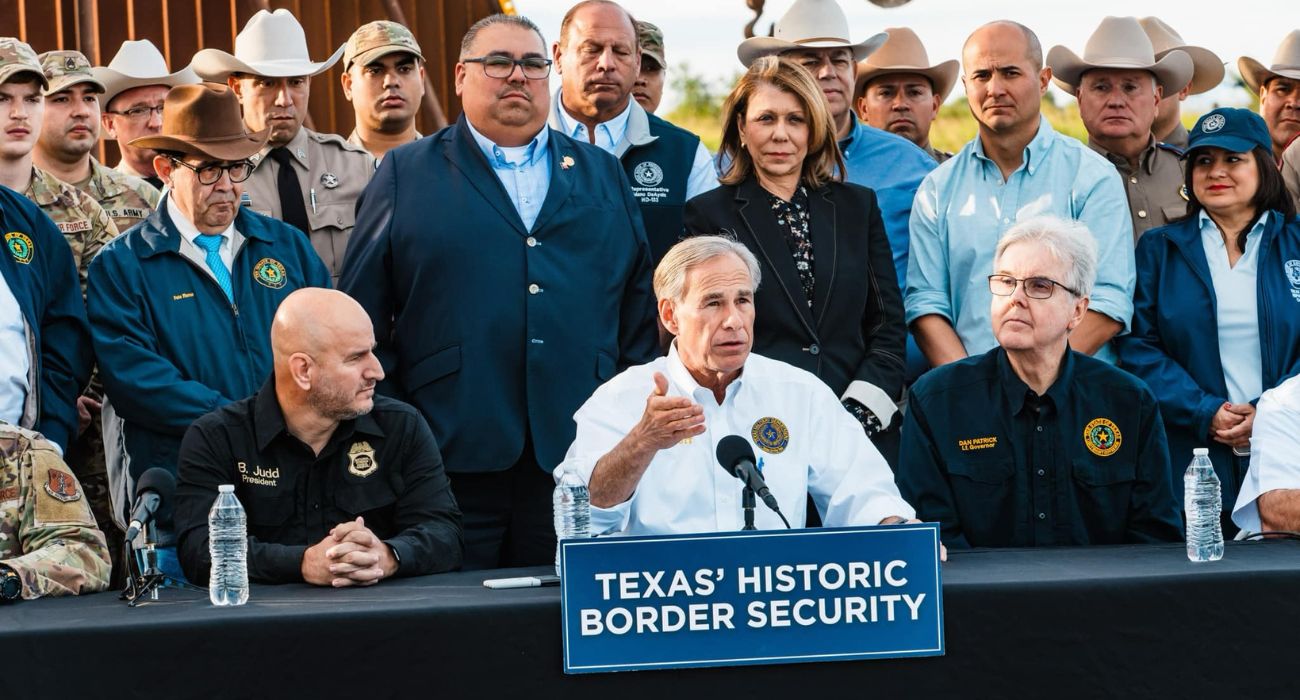Gov. Greg Abbott traveled to a border wall construction site in Brownsville on Monday to sign into law three bills that were passed during the third and fourth special legislative sessions this fall. The bill package addresses the governor’s priority of border security.
Prior to signing the bills, Abbott noted that the number of unlawful migrants entering the U.S. was much lower four years ago, adding that these numbers were due to “four policies put in place by the Trump Administration that led to such a low number of illegal crossings.”
“President Biden has eliminated all of those policies and done nothing to halt illegal immigration. President Biden’s deliberate inaction has left Texas to fend for itself,” stated the governor, according to a news release sent to The Dallas Express.
“Today, I will sign three laws to better protect Texas — and America — from President Biden’s border neglect. These laws will help stop the tidal wave of illegal entry into Texas, add additional funding to build more border wall, and crackdown [sic] on human smuggling.”

Abbott was joined at the event by Lt. Gov. Dan Patrick; National Border Patrol Council President Brandon Judd; Adjutant General of Texas Maj. Gen. Thomas Suelzer; Texas Border Czar Mike Banks; Texas Sens. Pete Flores (R-Pleasanton), Joan Huffman (R-Houston), and Charles Perry (R-Lubbock); Texas Reps. Ryan Guillen (R-Rio Grande City), Jacey Jetton (R-Richmond), David Spiller (R-Jacksboro), Mano DeAyala (R-Houston), Stan Kitzman (R-Pattison), and Janie Lopez (R-San Benito); and other border officials.
Patrick said at the event that border security has been “one of my biggest priorities since first being elected in 2006,” adding that, since he was elected, “Texas has increased border security funding more than any time in history.”
“It has never been more clear that Texas must step into the breach created by the border security liars and deniers Biden, Harris, and Mayorkas, and the signing of these three bills is indicative of the Texas Senate and my commitment to stemming the flow of illegal immigration and a strong southern border,” said Patrick in the release.
Texas Senate Bill 4, passed during the third special session, mandates a 10-year minimum sentence for those convicted of human smuggling.
Additionally, the bill establishes a five-year minimum sentence for those convicted of operating a stash house while also increasing criminal penalties for victim-related offenses that occurred during the crimes, such as assault or burglary.
Texas Senate Bill 3, passed during the fourth special session, provides $1.54 billion for constructing and managing the border wall along the Texas-Mexico border.

The bill also allocates $40 million in funding to the Texas Department of Public Safety for the overtime costs of state troopers who manage the border, as reported by The Dallas Express.
Finally, a second Texas Senate Bill 4, passed during the fourth special session, officially makes it a criminal offense to unlawfully enter the state from a foreign nation. The law also allows law enforcement officers to apprehend those suspected of breaking the law.
Although Abbott and Patrick expressed their support for each of the bills during the signing, not every elected official felt the same way.
After the bill signing, U.S. Rep. Joaquin Castro (D-TX) posted on social media that SB 4 is “a dangerous new law targeting immigrants + everyone who looks like them.”
The post included a copy of a letter addressed to U.S. Attorney General Merrick Garland requesting that the federal government pursue legal action to prevent the law from taking effect. The letter was signed by Castro and 20 other members of Congress.
The letter states that SB 4 (4th special session) is “an unlawful attempt to engage in federal immigration enforcement” and will “interfere with federal efforts to create a safe, humane, and orderly system at the border.”
“SB 4 is dangerous for the people of Texas and interferes with the federal government’s exclusive authority over immigration and foreign affairs. SB 4 also potentially impedes on due process and civil rights everyone in the United States is entitled to, regardless of the color of their skin or suspected immigration status,” reads the letter.


